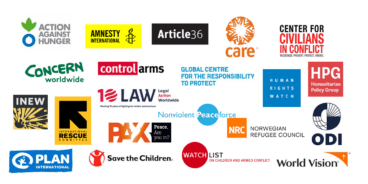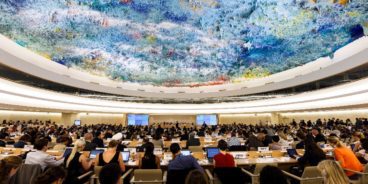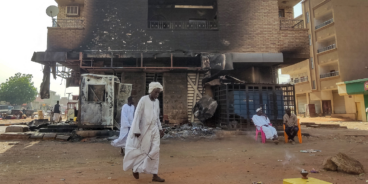
Regulating the veto in the event of mass atrocities
On 25 September the governments of France and Mexico held a ministerial side event on the use of the veto in mass atrocity situations at the UN Headquarters in New York. The following remarks were by Dr. Simon Adams on behalf of the Global Centre for the Responsibility to Protect, Amnesty International, Human Rights Watch and the World Federalist Movement as well as individual comments on behalf of the Global Centre.
On behalf of Amnesty International, Human Rights Watch, International Federation for Human Rights, the Global Centre for the Responsibility to Protect, and the World Federalist Movement, I am honored to deliver this short statement.
We thank H.E. Mr. Laurent Fabius, Minister of Foreign Affairs and International Development of France, and H.E. Mr. José Antonio Meade Kuribreña, Secretary for Foreign Affairs of Mexico, for convening today’s important meeting.
In 1945 veto power was conferred upon the five Permanent Members of the Security Council. These states were entrusted with the maintenance of international peace and security and commissioned to discharge these duties “in accordance with the Purposes and Principles” of the United Nations.
But it is an unfortunate reality that the veto has sometimes been used, not to defend against “the scourge of war,” or to “reaffirm faith in fundamental human rights,” but to shield perpetrators of mass atrocities from accountability.
In one of the most tragic examples from our times, on four occasions since October 2011 the veto has been exercised by Russia and China to protect the government of the Syrian Arab Republic from resolutions meant to address crimes against humanity and war crimes committed against the Syrian people.
At a time when urgent measures should have been taken to protect civilians in Syria from mass atrocities and to confront perpetrators, regardless of position or affiliation, the Security Council was instead paralyzed regarding a conflict that has now consumed more than 190,000 lives. Those vetoes undermined the legitimacy of the Security Council while the horrendous crimes of the government, as well as some non-state armed groups, continued unabated.
A veto cast against a draft resolution that seeks to end mass atrocity crimes is an abdication of responsibility by a Permanent Member of the Security Council.
This is the context in which we members of international civil society welcome France’s leadership in calling upon the Permanent Members of the Security Council to agree to voluntarily refrain from using the veto in mass atrocity situations of genocide, war crimes, ethnic cleansing and crimes against humanity.
Those who say that the Security Council cannot reform itself, that the politics of cynicism, national interest and narrow opportunism will always win over universal principles, will tell us that this cannot be done. But the need for veto reform is indisputable and support for this initiative is growing.
We respectfully urge all UN member states to impress upon the Permanent Members of the Security Council that they need to live up to their responsibilities and agree to a moratorium on the use of veto in mass atrocity situations. This should happen by the time of the 70th anniversary of the United Nations next year.
Such an initiative cannot undo history, nor correct past injustices, but is an important step in upholding and honoring the UN’s core promise to “we the peoples.”
***
That ends our joint statement, but I would like to use my remaining 89 or 90 seconds to say a few words on behalf of the Global Centre for the Responsibility to Protect.
It has been an honor to work closely with the French government and with other states that want to see veto reform, such as Liechtenstein, Switzerland and its partners in the Accountability, Coherence and Transparency group at the United Nations.
Mass atrocity crimes – genocide, crimes against humanity, ethnic cleansing, war crimes – are an affront to the Universal Declaration of Human Rights, and are a grave violation of international law, including the Genocide Convention. As such, they pose an intrinsic threat to international peace and security. We call them “crimes against humanity” because regardless of whether the victims are in Myanmar, Syria, Iraq, Sudan, Central African Republic or anywhere else, these crimes diminish us all. They offend us all. They are a violation of our common humanity.
The Responsibility to Protect, adopted at the 2005 World Summit – the largest assembly of heads of state and government ever gathered together – means that the five Permanent Members of the Security Council have a responsibility not to veto in a mass atrocity situation. This is an argument that has been made by the UN Secretary-General and is supported by a growing number of states and civil society organizations. Yesterday we saw President Bachelet of Chile use the world stage during her speech at the UN General Assembly to speak in support of this important initiative. And just this morning at a Ministerial side event on the Responsibility to Protect that was hosted by foreign ministers of the Netherland and Ghana there was broad support for a moratorium on the use of the veto in mass atrocity situations.
Deploying the veto to protect a state, or a non-state armed group, that is perpetrating atrocities is morally indefensible. When the abuse of the veto prerogative means that the Security Council is unable to protect threatened populations from mass atrocity crimes, then the veto has become a historical anachronism that the UN can no longer afford.
That is why we are calling for a “statement of principles” to be signed by the Permanent Members of the Security Council that affirms their commitment to refrain from using the veto in a mass atrocity situation. As we approach the 70th anniversary of the United Nations, formed under the historical shadow of Auschwitz and in the aftermath of a World War, it appears wholly appropriate that the Permanent Five should finally turn “never again” from an empty memorial slogan into a guiding operational principle.
I thank you.
Related Content


Joint recommendations for the Universal Periodic Review of Yemen
